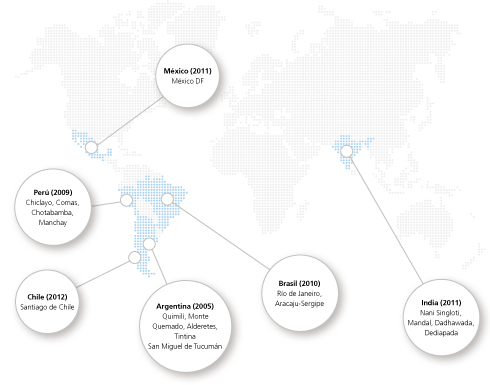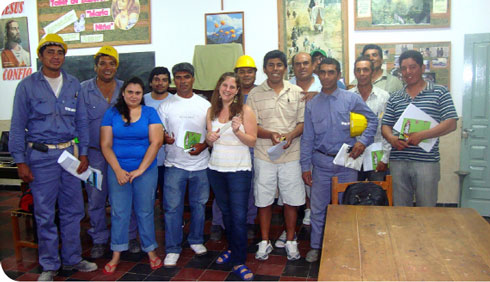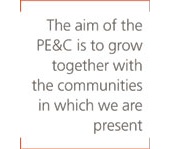 Abengoa
Abengoa
Annual Report 2012
- Corporate Social Responsibility
- People
- Communities
- Social development
Since the decade of the forties, the Focus-Abengoa Foundation has worked towards equating the economic, social and cultural development in countries where the organization is present. This is why it engages in series of programs and initiatives in the various geographical locations in which it operates.
In 2012 the company assigned 3.4 M€ to social development, out of which 2.6 M€ came from Spain, 0.3 M€ from Brazil, 0.2 M€ from Peru and 0.1 M€ from Argentina and Chile, among others.
PE&C: Persons, Education and Communities, Committed to development
The PE&C (Persons, Education and Communities Committed to Development) is a social development programme based on education, and is one of the pillars of Abengoa’s social actions. Since it started in Argentina, the program has become the sign of the identity of the company’s social undertakings, thus extending its scope of cooperation into Peru, Brazil, India, Mexico and Chile, rendering assistance to the most underprivileged groups: children, women, the elderly, the disabled, and families living in situations of poverty and social isolation.
The PE&C cooperates with local exemplary institutions and NGOs in supporting the most vulnerable social groups while involving its employees in the achievement of the various programs. These local organizations, with first hand knowledge of the needs and socio-cultural identities of said groups, work with teachers, cooks, health officers and volunteers to implement actions that support the social and economic progress of these communities.
The PE&C first started operating in Argentina, in: Quimili, Monte Quemado and Alderetes. Four years later, it entered Peru. In 2010 it also entered Brazil, in orphanages in Rio de Janeiro and Aracaju-Sergipe.
In 2011 the program entered India and Mexico. Last year the PE&C was introduced into Chile, starting its operations at the Hogar de Rebeca Ergas for women who are victims of abuses and their children. Studies are also underway to implement the program in the town of Torreblanca, Seville (Spain).
As a result of the various collaborations that Abengoa establishes in those countries, some children in India, between the ages of three and six from various villages are prepared for primary education. These children have the opportunity to learn Gujarati (the official language of the State), Mathematics and Writing. Women are also taught Personal Hygiene, Care and Nutrition to ensure healthy pregnancy and child growth.
In Brazil, assistance is provided to a large number of girls and adolescent victims of problematic family homes, abandonment and domestic violence, and to youths at social risks, who come around for social, educational and recreational activities. In Chile, also, assistance is provided to women in at the Hogar Rebeca Ergas, which works towards the protection of domestic violence victims and their children, by training and preparing them for the job market.
In Peru, Mexico and Argentina, Abengoa also tries to develop the personality, talent and creativity of the elderly, the disabled, women and children through educational, training and sports workshops. Help is also given to poorer families to improve their situation through education, home improvement and assistance. Abengoa intends to continue widening the reaches of the PE&C to open new horizons to the underprivileged. The program is expected to reach Spain in 2013, first stopping at Torreblanca, in Seville, to start work on the education and training of adolescents living in complex family and social environments.

The PE&C social program boasts of continuous control and follow-up. Each of its head offices is assigned a local coordinator who assesses the evolution and progress of each of the beneficiaries of the program and is in constant dialogue with the NGOs in charge of the project. Likewise, the PE&C has six national coordinators, one per country and a programs director who is in charge of the coordination, assessment and the general development of the project. The Corporate Social Responsibility Management regularly visits the various head offices of the program for an in situ verification of the development of the various projects and to obtain first hand knowledge of the opinions and evaluations of the PE&C employees, volunteers and beneficiaries.
In 2011, Abengoa obtained a tool based on the SROI (Social Return on Investment) methodology which permits the measurements of investments made and the efficiency of programs and initiatives set in motion. In 2012 this tool was used to evaluate the PE&C head office in Argentina and it will be used to evaluate the head offices in Brazil and Peru in 2013.
Volunteer programs
During the year Abengoa commissioned a global volunteer program based on the PE&C with a model for employees in Spain.
The program was commissioned with dual objectives: to make the organization employees active participants of the PE&C and; to create volunteer collaborators who may provide their capabilities, illusions and time towards improving the life quality and well-being of the beneficiaries.
There are three modalities of volunteers in the program:
- Financial donation: this entails the contribution of monetary amounts to any of the PE&C projects that, depending on one choice or another, would be used for the procurement of foods, school material and toys for children, etc.
- Time donation: entails providing remote collaboration capabilities for all kinds of works that do not necessarily require physical presence for implementation. The management and execution of such works are done through the company’s Intranet which contains the details of the projects.
- Solidarity holidays: Abengoa employees may volunteer at some PE&C head office locations during leave. This initiative will permit them to know more of the company’s social projects.
In addition to this initiative, the company organizes an annual Corporate Volunteers Calendar (CVC) implemented at all the head offices of the PE&C, Argentina, Brazil, Chile, Mexico, Peru and, from 2012 onwards, in India the latest of the head offices to join the project.
This calendar consists of key dates for various volunteer activities scheduled to take place in the organization such that employees in each of the countries where the program is under-way may participate in it.
Participation in CVC activities may be physically present, remote or through monetary or other means of donation. The assistance provided through this volunteer program is channelled through NGOs working with the organization in its PE&C.
An example is the “Tu proyecto cuenta” initiative which had its first edition in 2012 in Argentina. This initiative affords all the employees the opportunity to submit a plan of educational and social activities, and then execute them in the various head offices of the PE&C social development program in the country: Monte Quemado, Tintina, Quimili and Alderetes. Thus, the selected volunteers have been able to visit the various centres to offer training in workshops that they themselves organize.

The two projects selected by the employees themselves consisted of the creation of a workshop for preparing mosaics and trencadis (mosaics done using ceramic fragments joined with mortar), and the opening of a Decoupage (manual decoration technique in which coloured paper or material is glued onto various objects like wood, ceramics, metals, candles, soaps and glass, among others) training workshop, jewellery and technical drawing.
Sharing the skills and knowledge of the volunteers with various beneficiaries of the program and, this way, growing together, is the objective of the PE&C volunteer programs.

Peru’s School of Power line Technicians
In 2011, Abengoa commissioned a Power-line Technician School in Peru to impart training in high voltage tower assembly and montage to inexperienced persons from within the communities of the country where the organization is present.
This initial edition had a total of 50 persons in the Montage and Assembly module. They were trained for two months in both the theory as well as the practical aspect at the Senati Technical Institute and then given the opportunity to join the staff and work for one year, practising what they had learned. This means that all participants of the program would be able to work in the various projects that the company is executing in the southern Peru area.
Abengoa has already started with the second edition of the program, now in another city, Abancay, aimed at the personal and professional development of the youths of Apurimac region who can acquire the knowledge and practical training necessary to become Power-line Technicians. Like in the first edition, the academic guidance of the students is cared for by the professionals of the National Department of Training in Industrial Work (Servicio Nacional de Adiestramiento en Trabajo Industrial).
This time, however, the educational aspect of the program is imparted in-house to ensure that the students take maximum advantage of the program during the apprenticeship period. Abengoa is paying for the lodging and maintenance expenses.
Like in the Power-line Technician school in Peru, at the end of the course, the students will be granted the opportunity to participate in ongoing Abengoa Peru projects in the region to apply what they may have learned.
The initial edition of the program involved more than 300 hours of theory and practical training dedicate to, among others subjects, Blueprint Reading, Storage, Tower Transporting, Profile Classification, etc. In addition, the best five students of the class were given scholarships to help them continue their career as Power-line Technicians.
Two volunteers of Abengoa “Tu proyecto cuenta” program together with students of a Technical Drawing class in Argentina.

© 2012 Abengoa. All rights reserved
